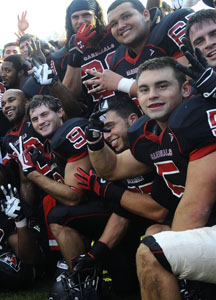A Public Service Entrepreneur
Perspectives of an Independent Volunteer, Lindsay Clarke ’05
Dschang, Cameroon
Where I live, I am a rare specimen: la blanche, ndege, white woman, depending on which language you speak. Most people in my community are anxious to meet me, and when they do, an onslaught of the same tired questions is often launched. The first thing they want to know is whether I am French or American. When I tell them that I am American, they want to know if I am a Peace Corps volunteer. When I explain that I am not, the same question inevitably follows: What organization are you with?
When I arrived here in January, I represented the cliche of young, bleeding-heart American volunteers: an English teacher hoping to better the lives of my students and foster the potential for the democratic future of Cameroon. Upon my graduation from Wesleyan, I was a fortunate recipient of the Christopher Brodigan Award for public service in Africa. The Brodigan Fund helped me, financially, to get my foot in the door, so to speak, on my journey back to Cameroon, the country in which I studied during my semester abroad junior year.
My proposed project was the end-product of several semesters’ worth of research on post-colonialism, imperial rivalries, globalization, and language as a manifestation of the contemporary impact of these subjects. Though Cameroon is officially bilingual in French and English, only a small minority in the southwestern region bordering Nigeria speaks English. (Let’s not forget to mention the 240-plus non-colonial languages spoken throughout the country.)
Cameroon at least feigns interest in the development of a functional, free, and transparent democracy. If there is ever going to be hope for the disenfranchised anglophone minority, English-speakers and the English language must become further incorporated into the Cameroonian public sphere and government. By promoting French-English bilingualism, the fissure between the anglophone and francophone populations can gradually be mended (or at least shrunk). It was on the premise of joining this fight for bilingualism that I first arrived in Doumbouo, a rural francophone village in Cameroon’s Western Province.
Just weeks after my arrival, however, it became clear to me that the inadequacy of my school’s language program was only a minor problem in the grand scheme of things. A lack of simple human necessities, such as clean water, adequate nourishment, and hygienic learning facilities was far more pressing than the hope for national democratic freedoms.
The kids, ages 5 through 16, were crammed into dirt-floor classrooms in groups of 30 to 90 students. In addition to lacking basic textbooks and school supplies, the children were fighting a constant battle against the pervasive dust and the chiggers that live in it (small insects that burrow into and implant eggs in the bare or sandaled feet of the children). The school grounds lacked a water source, which made not only for thirsty students but also unsanitary conditions. School lunches are such a distant dream that the students would most likely be confused if you suggested that they eat between the hours of 7 a.m. and 2 p.m. The potential for improvements to the learning environment was, and still is, enormous.
I e-mailed family and many friends, explaining my concerns and making a simple plea for people to reconsider the money they spend at home and whether or not they might be able to contribute a small amount to the development of the primary school in which I work. The $5 that an American might spend on a beer or a movie ticket or some unneeded item of clothing can buy two schoolbooks here. The cost of books, school supplies, cement, and other materials needed to equip the school might seem minimal in the eyes of many Americans, but relative to the economy here in Cameroon, it is enormous. In response to my request, we raised more than $7,000!
With this money we provided painted cement floors and walls for the classrooms, cabinets for school supplies, and fresh, clean water running from a newly installed water tap right on the school grounds. Books and supplies are already being collected in the United States and France to establish and equip a library across the street at the local public high school. Our goal is to build a completely new, specialized building to house the library.
As the community of Doumbouo sings praises about the “acts of god” that have been taking place at their public primary school, I take from this experience an unparalleled feeling of satisfaction and empowerment. The charitable spirit of the simple, everyday people who have contributed to this project has been astounding. As grateful as are the beneficiaries of this project, the benefactors are equally excited by the opportunity to contribute to a cause directly.
Having been disillusioned from years of study of ineffectual, inappropriate, and unsustainable development, I was uplifted by these projects. “Development” doesn’t have to be a dirty word. I hope others might be inspired to undertake their own projects that, like mine, change lives for the better. Just pack your bags, stamp your passport, and go!
Lindsay Clarke ’05 can be contacted at breaking.ground.cameroon@gmail.com. For more information, visit http://breakinggroundcameroon.blogspot.com.

